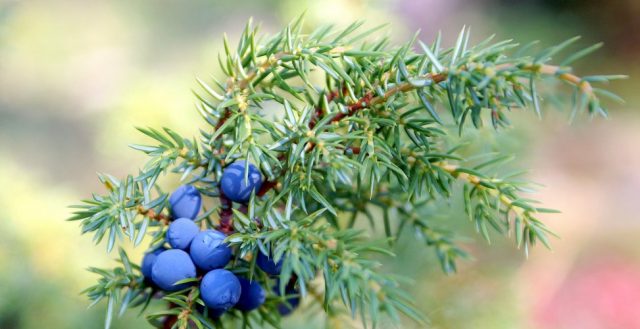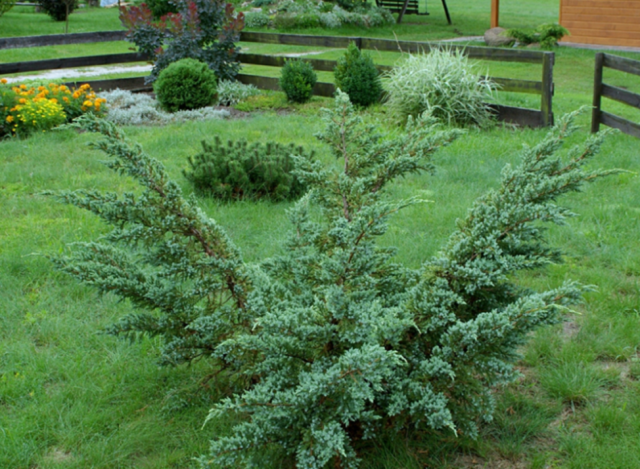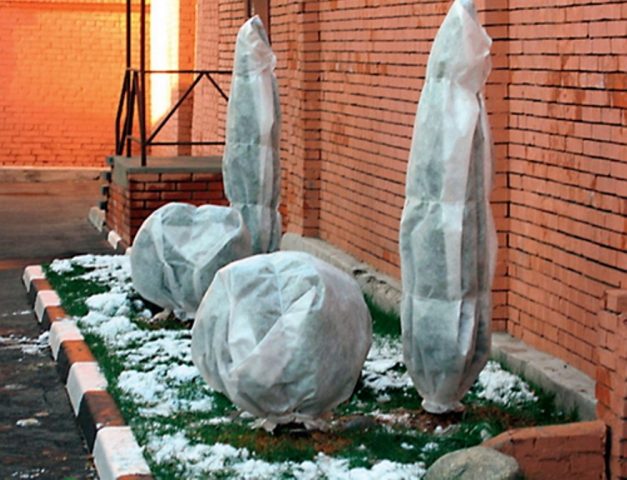Content
Meyeri's juniper is a durable, frost-resistant, coniferous plant that will adorn any personal plot. The ephedra gained great popularity for its beauty and unpretentiousness. Meyeri is a rather large evergreen shrub, an adult tree reaches a height of 4 m.
Description of juniper scaly Meyeri
Juniper Meyeri belongs to the ground cover plants of the Cypress family. The ephedra forms a bowl-shaped crown of irregular shape, up to 3 m in diameter. Lateral, falling branches give the shrub an unusual, fountain-like appearance. Juniper scaly Meyeri is a slow-growing shrub, the annual growth is 15 cm.
Flexible shoots are covered with dense needles, the length of the needles reaches 10 mm. The ephedra gained its popularity for the unusual color of the needles. In mid-May, during the period of active development, the shrub is covered with blue-gray needles.
A well-branched root system is located superficially, therefore, an area with surface groundwater is not suitable for planting.
Single-seeded fruits, in the form of cones, are colored dark gray.
Juniper scaly Meyeri gave life to new varieties:
- Blue Star - the needles are arranged in the form of miniature stars.
- Blue carpet - ground cover shrub, spreads along the ground, forming a gray-blue carpet.
- Compact - a new variety that gardeners immediately fell in love with.
Brief description of the scaly juniper Meyeri Compacta:
- a small plant, the height reaches up to half a meter;
- densely growing needles are painted in a silvery heavenly color;
- the species is frost-resistant;
- prefers an open, sunny area and well-drained soil.
To reveal the beauty of the Meyeri scaly juniper, you need to view the photo.
Juniper Meyeri in landscape design
Due to its unusual needles, Meyeri's scaly juniper looks decorative, so it is often used to decorate a summer cottage. The shrub is planted on alpine hills, in rose gardens, rocky and coniferous gardens. Due to the small annual growth, the shrub is planted in flower pots, using it to decorate the roof, terrace, veranda, balconies and loggias.
Planting and caring for Meyeri scaly juniper
Juniper scaly Meyeri juniperussquamatameyeri is an unpretentious ephedra, which, with proper care, will become an adornment of the personal plot. The key to good growth and development depends on the correctly selected seedling, planting and adherence to growing rules.
Seedling and planting plot preparation
Before purchasing a Meyeri juniper, you must carefully study the description, view photos and videos. You need to buy a seedling from trusted suppliers or in a nursery. A properly selected seedling should have:
- bark - evenly colored, free from cracks, damage and signs of disease;
- the root system should be well developed and braid with an earthen lump;
- needles - evenly colored.
Meyeri scaly juniper seedlings are best purchased at 2 years of age, since a young plant will quickly take root in a new place.
Ephedra prefers a well-lit place. When planted in the shade, the shrub will lose its decorative effect: the color of the needles will fade, the bark will acquire irregularities, the crown will thin out. The shrub is unpretentious to the composition of the soil. But it grows best on fertile, well-drained soil with neutral acidity.
The plant can be planted in an open area, as it is not afraid of drafts and gusty winds.
So that a young seedling quickly takes root in a new place, does not get sick in the future and develops well, before planting, the roots are treated with the drug "Kornevin".
Landing rules
Planting and caring for Meyeri's juniper is simple. The main thing is to timely follow the recommendations of experienced gardeners.
Meyeri scaly juniper is planted in the spring, after the air temperature warms up to + 6 ° C. Planting a seedling is carried out according to a certain scheme:
- The planting hole is dug 2 times more than the root system.
- If several plants are planted, the interval between the holes should be at least 1.5 m.
- A 15 cm layer of drainage is laid on the bottom (sand, broken brick, pebbles, expanded clay).
- The seedling is carefully removed from the container and placed in the center of the hole with a lump of earth.
- Sprinkle the seedling with nutritious soil, compacting each layer so as not to leave an air space.
- The earth is tamped, spilled and mulched.
- For the first time after planting, the juniper is hidden from direct sunlight.
In order for Meyeri's scaly juniper to quickly take root and grow, it is necessary to carry out timely care. Caring for a plant does not require special skills, so even an inexperienced gardener can grow it.
Watering and feeding
Juniper scaly Meyeri is a drought-resistant plant, so in rainy summers it can be left without watering. In the hot, dry season, watering is carried out once a week. Also, the ephedra will not give up irrigation by sprinkling. This procedure will remove dust from the needles, increase the humidity of the air and fill the air with a pleasant aroma.
If the seedling is planted in a nutritious soil, then fertilizing begins in 2-3 years. An adult plant is fertilized in spring and autumn. Spring feeding is necessary for good growth; for this, nitrogenous fertilizers are used. In the fall, a phosphorus-potassium dressing is introduced. It will help the juniper cope better with winter frosts.
Bird droppings and fresh manure should not be used as top dressing, as they cause a burn of the root system, which will lead to the death of the plant.
Mulching and loosening
After watering, gently loosening and weeding of weeds is carried out. The trunk circle is mulched. Peat, hay, dry foliage, or a pine needle can be used as mulch. Mulch will greatly facilitate the work of the gardener: retain moisture, stop growth weeds and will become an additional organic top dressing.
How to prune Meyeri's juniper
Meyeri juniper tolerates crown formation well. This is done in early spring, before sap flow, using a sharp, sterile instrument.
In the spring, sanitary pruning is also carried out, getting rid of non-wintered, broken and diseased shoots. After shearing, Meyeri's scaly juniper is necessarily treated with fungicides.
Shelter for the winter scaly juniper Meyeri
Juniper scaly Meyeri is a frost-resistant conifer, therefore it does not need protection from cold weather.Since the adult plant has flexible, curved shoots, so that they do not bend under the weight of the snow, they are tied together.
In order for a weakened young plant to survive the winter safely, it must be covered for the first 2-3 years. To do this, use:
- snow - a snowdrift is thrown onto the connected structure and made sure that it does not freeze and cannot harm the plant;
- spruce branches - pine branches perfectly allow moisture and air to pass through and at the same time protect young shrubs from strong winds and spring sun rays;
- non-woven fabric - part of the plant is covered with agrofibre, leaving room for fresh air.
In regions with a harsh climate and winters with little snow, a young Meyeri juniper is dug up, transplanted into a container and brought into a cool room.
Reproduction of Meyeri Compacta juniper
Juniper scaly Meyeri can be propagated in several ways:
- cuttings;
- seeds;
- taps.
The best time for grafting is considered spring, after formative pruning. To do this, cuttings 10-15 cm long are cut from the cut branches. For better root formation, the seedlings are kept for several hours in a Kornevin or Epin solution. Then the planting material is buried at an acute angle into the fertilized soil by 1.5 cm. For fast rooting, a micro-greenhouse is made, where the temperature will be kept within + 20 ° C. After 3 months, the cutting will take root, and after 12 months it will be ready for transplantation to a permanent place.
Seed reproduction is a difficult, painstaking task, therefore, it is better not to undertake this method of propagation for a novice gardener.
The use of branches is the easiest method of propagation of Meyeri scaly juniper. A healthy, lower, young branch is laid in a trench and covered with earth, leaving the top above the soil surface. The earth is spilled and mulched. After 6 months, the shoot will take root and can be separated from the mother plant.
Diseases and pests of juniper scaly Meyeri Compact
Juniper scaly Meyeri is resistant to many diseases. But when grown in regions with an unstable climate, exceptions are possible. Also, young, immature plants are often exposed to various diseases and attack of insect pests.
Fusarium - a fungal disease, often progresses with an excess of moisture and insufficient lighting. In the initial stage, the disease affects the root system. Without treatment, the fungus rises to the crown, the needles turn yellow, dry out and fall off.
Drying of shoots - with a disease, the wood begins to dry, growths form on it, the shoots turn yellow, the needles crumble. The fungus hibernates under the bark and if the autumn treatment is not carried out, then in early spring the disease will begin to progress with renewed vigor.
Alternaria - the fungus affects only the lower branches. A sign of the disease is the brown color of the needles and a pronounced black bloom on the bark. Without treatment, the branches will begin to dry out. The cause of the onset of the disease is a thickened planting.
Fungicides will help get rid of diseases.
Spider mite - the needles are covered with a thin web, over time it dries up and falls off.
Shield - the pest affects fruits and needles. The plant stops growing and developing, the needles dry out and fall off. Without treatment, the juniper sheds all the needles, while losing their decorative appearance.
Such drugs as "Iskra", "Aktara", "Kodifor" and "Fufanon" will help to cope with pests.
Conclusion
Meyeri's juniper is a beautiful, durable, coniferous plant that, with minimal maintenance, will decorate a personal plot. Due to its gray-sky color, the shrub looks great in rock gardens, rose gardens, among perennial flowers, in rocky and coniferous gardens.











